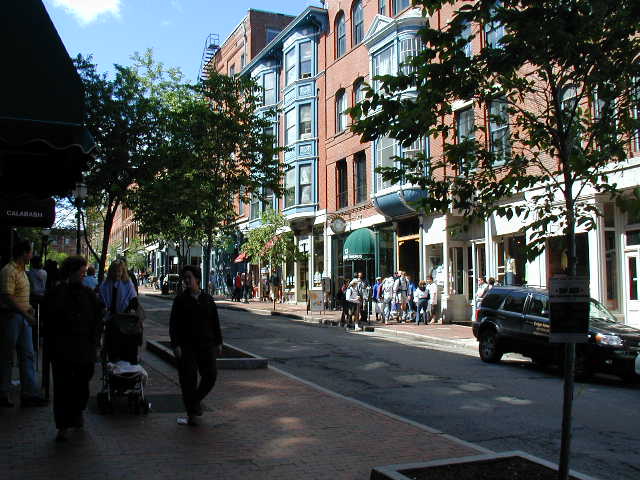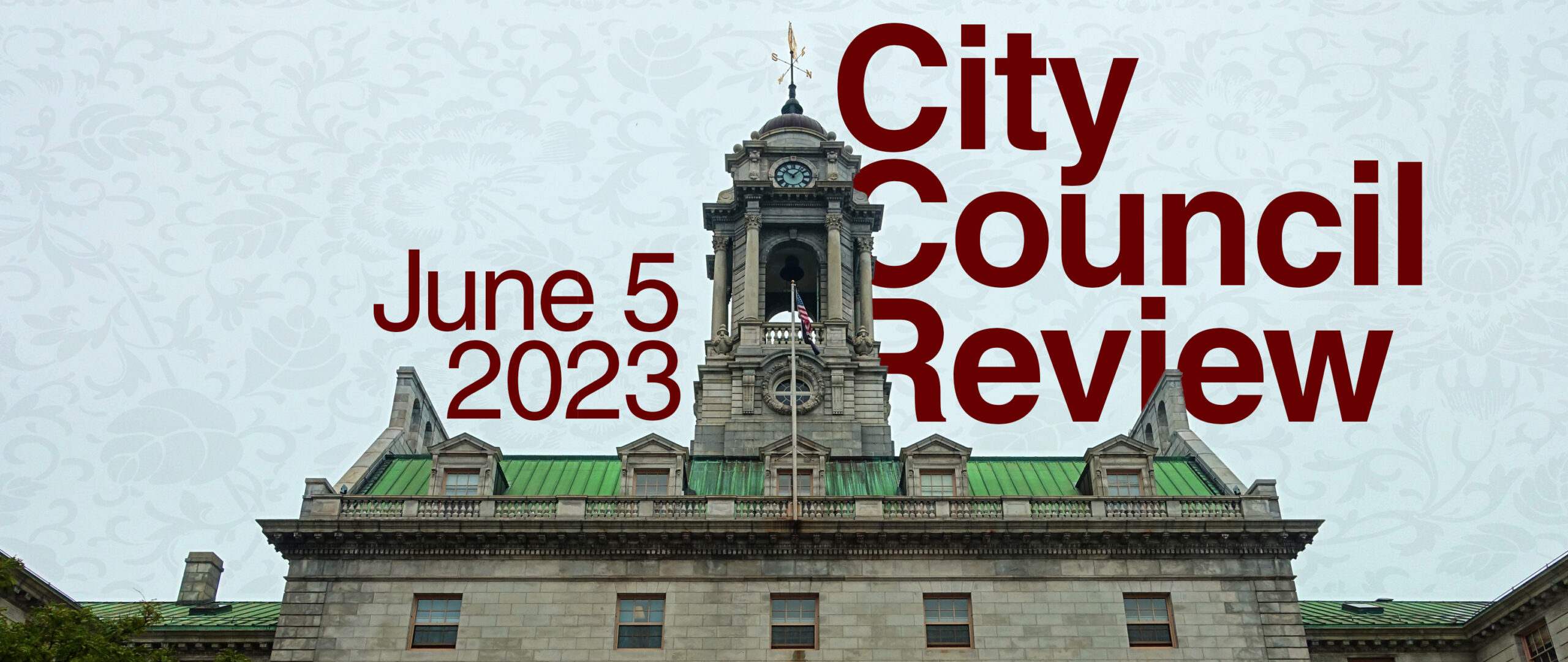The City Council’s June 5th meeting covered a broad slate of agenda items, including updates on encampments, asylum seekers, and a complicated measure aimed at incentivizing affordable housing development.
All Councilors were present in person, with Councilor Trevorrow joining late around 5:30.
General Public Comments
Harley Lewin of Tyng Street was the first to speak during the 5:00 public comment period. Lewin, attending in person, shared with the Council that he endured a physical assault from “tent people” while walking his dog in Harborview Park. He expressed his concern over the behavior of people living in tents in the park, and urged the City to find a more “humane” solution. Mayor Snyder responded to his comment to share that a listening session would take place the following week about encampments in the city, encouraging members of the public to attend. This will take place on June 13th, beginning at 5:30 PM.

Amina Conte spoke next. Conte stated that she had witnessed racial profiling of Black shoppers and staff by police officers at Whole Foods, as well as experiencing it herself. Conte went on to say she believes she has been followed by police officers ever since she reported the profiling incident. “It’s really scary,” said Conte, “I don’t know what to do.” City Manager West appeared to speak privately with Conte during a later break in the meeting.
Following some technical problems with Zoom, George Rheault made a public comment remotely, asking the City to recognize National Caribbean Heritage Month. He also criticized the Council for not including more low-income residents and residents of color during the Bayside Master Development Plan planning process.
Robert Hains of Holm Avenue commented next in Council chambers. Having heard that the Blueberry Road housing project may have fallen through, Hains described a piece of land he owns that might be suitable for such a project. He also suggested that the City Council consider raising the number of signatures required for referenda to be added to the ballot, claiming it is too easy for some groups to add their measures to the ballot. “It’s not supposed to be easy,” Hains said. He seemed to make a reference to the Maine Democratic Socialists of America, but was unable to recall the group’s name.
Recognitions & Proclamations
The recognitions period followed. First, Councilor Mark Dion recognized the Deering Center Neighborhood Association for their Memorial Day event, specifically naming Bobbi Cope and her team, as well as the local VFW chapter. He commended the local leaders for hosting the event, which included a parade and speeches, and corrected a news story which reported that the DCNA-organized event had been organized by the City.
Next, Mayor Kate Snyder recognized Portland Public Works employees Stan Mason and Justin Cusack for their 1st place prize in the Maine State Snow Plow Rodeo. The team will go on to compete at the national event in Colorado.
Three proclamations were made, each by different members of the Council. Councilor Andrew Zarro proclaimed the month of June LGBTQ+ Pride Month, highlighting the strength of Portland’s queer community and the anniversaries of the Stonewall riots, the passage of marriage equality in the United States, and the first Pride marches, all of which take place in June. Gia Drew, Executive Director of Equality Maine, was in attendance to receive the proclamation.
Councilor Victoria Pelletier read the proclamation for Juneteenth, commemorating the day the last slaves were freed in 1865 in Galveston, Texas, over two years after the Emancipation Proclamation. She recognized the “moral stain of chattel slavery on this country, as well as its long legacy of systemic racism, inequality, and inhumanity,” while also uplifting the “courage and hope” of the Black community in the face of these injustices.
June was also proclaimed Immigrant Heritage Month, the proclamation read by Councilor Pious Ali. Ali celebrated immigrants to the U.S. for their contributions – economic, social, and cultural – to the country, adding that these contributions are often “overlooked and undervalued.”
Appointments
The first appointment was then read, Appointing William Needelman as Class E Director of Fish Exchange. During public comment, George Rheault attempted to chime in over Zoom, but was met with another bout of technical difficulty that rendered him inaudible to the Council. Following a ten-minute pause, staff seemed to have resolved the issue, though Rheault seemingly did not attempt to comment on the matter again. The appointment passed unanimously.
The next appointment, Order 226-22/23 Appointing Constables for the Parks, Recreation & Facilities and Police Departments and Jetport Garage Employees for 2023, enrolled a number of park rangers and police cadets as constables, following a minor amendment changing one of the appointees for another. Constables appointed by the City are able to enforce certain aspects of city ordinances, but cannot make arrests. The appointments passed unanimously.

The final appointment, Confirming Governor Mills’ Appointment of John Henshaw to the Board of Harbor Commissioners, required the City’s approval due to Commision rules. The confirmation passed unanimously.
Consent Items & Licenses
Two items were added to the Consent Calendar: the July 4th Festival, including fireworks and street closures, happening on the East End; and the Open Air Sundays Festival, happening on Sundays from June 16th to September 23rd on lower Exchange Street between Middle Street and Fore Street. Councilor Zarro shared background on the new initiative, which closes off the street to cars in an attempt to “energize and placemake” the area, said Zarro. Both events passed unanimously.

A number of licenses were granted at the meeting. N to Tail and Riverton Station were approved for outdoor dining licenses; new owners of Green Elephant and Portland Beer Hub were both awarded licenses; The Henry, Commercial Street Pub, and Thanh Thanh 2 all were successful in changing the classification of their licenses.
Budget Items Delayed
The budget, though representing a hefty portion of the evening’s agenda, took minimal time. Snyder clarified that all budget items would be voted on at the following Council meeting, but that public comment was open for the budget at this meeting. However, no members of the public came forward to comment, so the Council simply moved to postpone all budgetary orders until the next meeting.
Communications
Communications items provided an update on some of the major items facing the City Council.
The first Communication item renamed the City Manager Search Committee to the Search Committee of the City Council, reflecting the Committees work to source candidates for positions beyond just City Manager. The Committee is currently searching to permanently fill the role of Corporation Counsel.
Communication 35 was presented by Kristen Dow, Director of Health and Human Services. Dow shared news that the Expo Center, which has been in use as an emergency shelter since April, will stop being used in that capacity as of August 16th. Regular programming at the Expo Center resumes in September, which informed the date. In light of this deadline, the Expo Center has stopped accepting any new people seeking shelter, with the intention of “depopulating” the space in time. Dow commended staff and volunteers for ensuring that the space was “run very smoothly”; per Dow’s communication memo, 393 unique individuals have been served in the Expo Center since its opening as an emergency shelter.
The next communication item was also read by Dow, this time concerning the Encampment Crisis Response Team (ECRT). The newly formed team’s aim, per the communication, is to “improve our encampment removal process by working directly with individuals living in encampments to transition them into shelter or housing prior to removal.” The ECRT has replaced the previous Task Force concerned with encampment response. Dow shared that a wide range of service providers are members of the ECRT, calling it an “ownership of the entire community.” One of the ECRT’s first steps will be to hold a listening session on June 13th from 5:30 to 8:00 PM to hear concerns from the public.

Also as a part of this communication, Mayor Snyder shared a letter that she and West wrote to Governor Mills seeking mutual understanding and assistance. Snyder said that since January of 2023, an average of 80 new asylum seekers have arrived in Portland every week. She also shared that the City is currently hosting 654 municipal shelter beds. Unable to meet demand, Snyder and West’s letter asked Mills for help. “It’s more than we’ve ever seen,” said Snyder on Monday night.
Though no public comment or vote takes place on communications items, members of the Council had input for Dow on the ECRT update. Councilor Forunier suggested that the June 13th listening session should be made more accessible to ensure all community members could attend. Councilor Zarro openly wondered if any specific policy recommendations had emerged after the ECRT’s first meeting on May 31st – Dow had none to report. Councilor Regina Phillips asked how often the entire team would meet, to which Dow shared that a regularly scheduled formal meeting had not been implemented, but that ECRT members are in “constant communication” over email.
Councilor Dion expressed concern for the needs of those living and conducting business near encampments, and asked for information about the more immediate steps that the team plans to take. No specific steps were offered by Dow or West, who also chimed in at this point, but West suggested concerned individuals could attend the June 13th listening session. Councilor Rodriguez asked what metrics are being used to determine which encampments would receive the team’s attention; Dow responded that the metrics are still being developed, though the size of the encampment and the number of calls for service are two data points that will likely be included.
Resolutions & Orders
Moving on from communications items, Councilor Ali presented Resolve 9, Reaffirming a Sister City Relationship with Cap-Haïtien, Haiti. Part of the resolution that Ali shared involved supporting Konbit Santé’s summer fundraiser. Konbit Santé is a “Portland-based, non-profit health care organization established in 2001 for the purpose of developing a sustainable health care system to meet the needs of the Cap-Haitien community.” The specifics of the City’s support for the fundraiser were not detailed in the meeting.
At the public comment period, George Rheault spoke in person, arriving after having been unable to get through over Zoom. Rheault wondered if anyone from Cap-Haïtien was involved in the reaffirmation, and suggested that the relationship between the cities should be “real,” not just symbolic. He also wondered what Portland could meaningfully offer to Cap-Haïtien, given that the City is currently handling numerous urgent issues, as evidenced by previous agenda items.
Councilor Ali responded directly, saying that staff from Konbit-Santé, some of whom are Cap-Haïtien residents, initiated the request for reaffirmation of the sister city relationship.
Order 224, concerning a funding measure for Creative Portland, was postponed to the budget discussion on June 26th.
Order 238, Accepting the Cumberland County and City of Portland Analysis of Impediments to Fair Housing, came next. Mary Davis, Interim Housing and Economic Development Director, presented the order over Zoom, technology problems seemingly resolved. Because the City receives federal funding under the Fair Housing Act, the City is required to have studies conducted analyzing impediments to fair housing. In her presentation, Davis acknowledged that focus group sessions for LGBTQ+ and BIPOC residents yielded no turnout.
George Rheault spoke again during public comment, stating that the report included “mistakes, bad history, and distorted history.” Rheault cited one example of a historical error made by the report, relating to the demolition of Union Station, and alleged there to be others. He questioned the study’s attempts at community outreach, pointing to the lack of community involvement in focus groups, and called the report a “meaningless exercise.”
Councilor Forunier spoke next during Council discussion. Fournier pointed to the study’s finding that housing vouchers aren’t being widely accepted, and asked what next steps the city could take. Davis said that her department is in the process of figuring this out. Councilor Ali asked how often these studies are conducted, to which Davis replied “five years.”. Councilor Zarro wondered if this suggested that new HUD funding was forthcoming, but Davis clarified that conducting the study is a requirement for the funding the city already receives.
Order 224, Approving Changes to the Tax Increment Financing Policy, was again presented by Davis. The order would consolidate wage requirements for the Tax Increment Financing (TIF) Policy. As it stands, conflicting wage rates complicate the ability for developers to easily conduct affordable housing projects. Certain developers are required to adhere to Davis-Bacon wages – a federal prevailing wage figure for construction workers. However, the current Portland TIF Policy requires developers to use either state prevailing wage or Portland minimum wage to determine this figure, whichever is higher. Per the Order’s memorandum, “the double requirement can be costly for developers, both in reporting time and in practice.” The Order presented to Council on Monday evening would allow developers who are required to use Davis-Bacon wages to substitute those wage requirements for the Portland TIF policy wage requirements.
Steven Scharf of Brackett Street spoke during public comment, inquiring about what kind of staff time would be involved in the implementation of this order. An employee from Avesta Housing also spoke in favor of the order during public comment.
Council discussion brought two issues to the fore. First, multiple Councilors expressed hesitation about the possibility of this order lowering wages for any workers. Davis admitted that this was a possibility, though not a given. However, through the discussion, it emerged that many construction workers already receive well above any of the wage requirements. Nonetheless, the possibility of this change lowering wages could not be not entirely eliminated.
The second issue was the streamlining of affordable housing projects. Davis shared that only two affordable housing projects are currently in the pipeline, a notably low number. The order’s attempt at consolidating bureaucracy would hopefully incentivize more affordable housing development.
Torn between the need for more affordable housing and the possibility of lowering pay, some councilors seemed hesitant to cast their vote, but ultimately the order passed unanimously.
The final orders of the night were first reads, requiring no public comment, discussion, or vote until the following meeting on June 26th.
Mayor Snyder adjourned the meeting at 8:17pm.
Erica Snyder-Drummond – Erica is a proud Portland resident, documentary filmmaker, and baker. Previously she has been a campaign canvasser, an immigration advocate, and a server. You can see more of her work at www.ericajsd.com.


